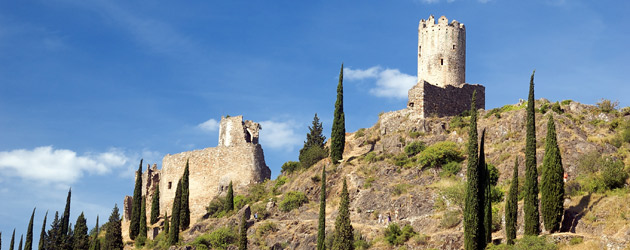Paratge Saga • Meaning of Paratge •

Setting of the Paratge Saga
Some called the land Occitania.
They were few, fewer today. All the same, they and the land existed. At its height, monasteries, where monks sang their devotion, dotted its green reaches; and castles, where troubadours sang songs of love and heartache, capped its rugged hills.
Along the rivers and valleys, people fought for possession of the land – with each other, and often with the land itself. And always, the fiercely independent inhabitants resisted domination from outside, for Occitania was as much temperament as place.
The ruins of those castles and monasteries that today mottle the landscape bear testimony to these epic struggles. You can see the scars of this endless conflict in the South of France in the area known as the Midi, but which through history has been conjured by other names: Narbonensis, Septimania, Aquitania, Pays d’Oc, Languedoc, Provence.
Occitania ….
Ever a nation unborn, it is wedged between bright Mediterranean and darker Atlantic (the French say, entre deux mers, between two seas). It is also defined by the rocks of the Pyrénées, and of the Alps, and of the Massif Central to the north.
Occitania is veined by rivers: in the east the Rhône, concourse of civilizations; to the north, the Dordogne and the Lot spilling from the Massif Central; and to the south, the Garonne and its tributaries, such as the Ariège, draining the Pyrénées.
The land through which the rivers flow is richly varigated – dense, primeval forests of conifers and evergreen oaks; alluvial plains bedding rich soil for farming; barren places where the scrub brush called maquis reigns; and sun-saturated soil where the olive and the grape thrive.
In some areas, as in the Ariège, the land wears its skin thinly on the bone. Here the limestone core erupts through the soil in a jumble of arêtes, crags, and jagged outcrops (called pogs) rising, finally, to the double, sometimes snow-topped, peak of St. Barthélemy and the mass of the Pyrénées beyond. It is a land pocked with caves that run deep into the core of the earth.
And if the limestone presses up from below, the blazing Mediterranean sun presses down from above, heating the land and all people who move upon it.
The People of Occitania
The word that now names this area – “midi” —also means midday and it is here, in the tension between daybreak and dusk, between raging ocean and glittering sea, that many peoples came over the mountains, along the rivers, and through the valleys to possess the land.
In limestone caves they left paintings, now tens of thousands of years old; along the Mediterranean they planted olives and vines; in the valleys they built cities fed by great aqueducts and graced by temples; in the heat of bonfires they burned for their religion (or burned others for their religion); in castles their troubadours sang of a new way of love and passion in an Occitan language which still lives … barely.
And in the thickets they called maquis, descendants of this Occitania dared to resist the Nazi onslaught and to declare their defiance.
In the Paratge Saga we meet them all.
Through the ages these people struggled to create in the midst of destruction. They fought to preserve the principles of paratge – honor, grace, tolerance, civility, excellence – even before they invented a word for it. Throughout, a few kindled the fire of Occitan spirit when it seemed about to die.
It was a fire they carried with them when they came in wave after wave of peoples. And each new wave of people, each new occupation, left its sedimentary layer – some, like the Celts and Romans, rich with the humus of creation; others, like the Nazis, thick with the clay of destruction.
But, always, the spirit of Occitania, like the yellow maquis that finds a way through clay, pierced the surface and flowered. For the people were a part of the land, and the land of them.
Paratge Saga • Meaning of Paratge

